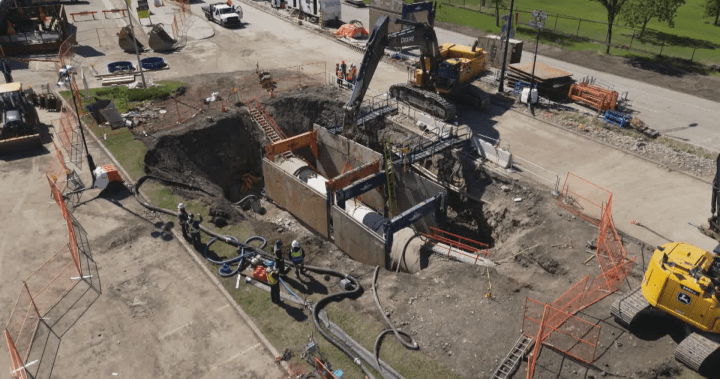The City of Calgary is seeking approval to borrow $1 billion for a slate of water infrastructure projects when council meets to discuss the budget next week.
According to budget documents released last week, city officials are looking to borrow “up to a maximum of $1,038,718,000 to a maximum term of 25 years for water resources.”
The request comes after a summer of water restrictions due to a critical rupture of the Bearspaw feeder main, a main artery in the city’s water system.
City administration notes the catastrophic break as a risk of not increasing utility rates to pay for new water infrastructure.
“As we have seen with the Bearspaw Feedermain, lack of redundancy has significant implications for our water system in times of infrastructure failure,” administration said in its recommended investments.
Administration’s list of proposed projects includes advancing two new feeder mains to the north and south, and a new water treatment plant near the current Bearspaw Water Treatment Plant.

Get daily National news
Get the day’s top news, political, economic, and current affairs headlines, delivered to your inbox once a day.
The documents include a warning that the city’s current infrastructure plans “are not keeping pace with growth,” and note a risk of “insufficient treatment and distribution capacity.”
“Anytime we can get strong infrastructure projects moving forward to accommodate the type of growth we are seeing in this city, it’s imperative that we do it,” Calgary mayor Jyoti Gondek said Tuesday.
“The feeder main break this summer, we’re still waiting to see what exactly caused it, but I would say understanding how quickly our city is growing and the type of infrastructure we need is the most important thing here.”
However, there is a lack of details around exact budgets for any of the proposed projects, with timelines slated to go beyond the current 2023-2026 budget cycle.
It’s concerning for Ward 1 Coun. Sonya Sharp, who said she would prefer firmer details before borrowing such a large sum of funds.
“The borrowing is not the issue, it’s the how much and when,” Sharp said. “I would’ve liked to have seen this more spaced out with the design, and when they’re ready to build it, come and build it.”
Sharp said she and other members of council want the projects to move forward, but said the unknown costs could be an issue.
Budget documents show the loan would be repaid through off-site levies and user fees, which are also set to increase in this year’s budget.
City administration is proposing increases to utility rates in both 2025 and 2026, which are expected to cost the average homeowner an extra $5.09 per month next year and an additional $5.46 per month in 2026.
The rate increases will also go towards new infrastructure, and are expected to fund base operating expenditures of $105 million in 2025 and $40 million in 2026.
City council will begin budget deliberations on Monday.
© 2024 Global News, a division of Corus Entertainment Inc.
Read the full article here
